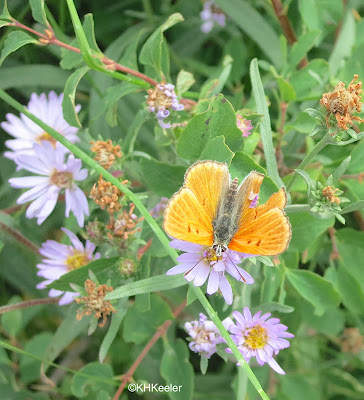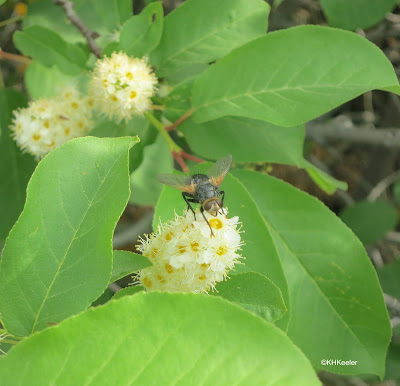We need to revise our attitude toward insects.
 |
| bumble bee on echinacea flower |
There some 91,000 named species of insect in the U.S. If I listed the pests, I'd probably not make 1,000--make it 3,000 if you prefer--which is a very small part of 91,000 (3%). Conclusion: most insects are not harmful.
 |
| Battered, late-summer butterfly feeding |
In fact, insects as a whole are important to our lives, pollinating crops, cleaning up dead things and recycling them, enriching the soil, providing food for larger animals, enhancing human life (lightning bugs, butterflies), to name a few important things insects do.
And yet we wage war on them. Most people can think of bad insects, but take a minute to think of good ones. Wow! Is that ever a failure of marketing! 97 of 100 insects are no problem to humans but we think only of the pests!
 |
| Fly photographed on wild cherry flowers in Rocky Mountain National Park. I doubt it bothered a human in its entire life, but my reaction was "ugh!" |
I admit I thought of pest insects first and took a moment to remember the good ones. So I'm going on an "appreciate insects" kick. I'll stand and watch not just butterflies and bees, but smaller things I can't name as they fly through my garden. I'll look for holes in leaves to see if I can turn one over to see a caterpillar--in the books they have cool tufts or orange racing stripes or horns--maybe I can see one of those. I'll wait a minute when the piece of bark I bumped reveals a beetle, to see where it goes. And when I move the paving stones in my path, I'll sympathize with the ant colony, watch them rush the eggs and larvae to safety, and marvel that they live their lives in my yard and I never knew.
What is its name? What else does it do? I don't know.
I don't know how we make radical changes in the image of insects. And yet, if we are going to create sustainable ecosystems, we must. Insects play all those major parts in healthy ecosystem: pollinating plants to recycling plant and animal material, as food for vertebrates, aerating the soil,controlling the numbers of other (pest) insects, see for example Nature Conservancy Canada. We won't survive if we remove insects from ecosystems, and we have been casually doing just that.
What can I recommend? Watch insects. See if you can spot a ladybug in action; I didn't think aphids moved at all, but faced with a predator (the ladybug), they went quickly around the plant stem and when that didn't work, dropped off stem. Learn about insects; if you know the wasp flying under the tomato leaves is hunting caterpillars, you might find it less threatening. And look carefully; we have hundreds of native bees, there is more than just "a bee" to see.
 |
| green bee on spiderwort- that's certainly not a honey bee or bumblebee! |
Consider your prejudices and how you might live with insects despite having been taught to kill them on sight. I find that difficult. And yet, I don't think it is optional. We need to live in a world rich in diverse insects or the pollination, soils, birds, and many other things we take for granted will sharply decline. To do that, we need a radical rethinking of our relationship to insects, individually and collectively. I'm starting with me.
Comments and corrections welcome.
Kathy Keeler, A Wandering Botanist
More at awanderingbotanist.com
Join me on Facebook: https://www.facebook.com/AWanderingBotanist


Agreed. A simple "bug home" or pollinator friendly area in the garden are ways we can help. Especially reducing use of pesticides.
ReplyDelete